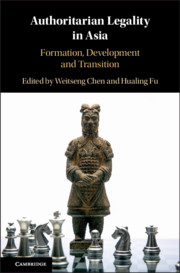Book contents
- Authoritarian Legality in Asia
- Authoritarian Legality in Asia
- Copyright page
- Contents
- Tables
- Notes on Contributors
- Acknowledgments
- Abbreviations
- Introduction Authoritarian Legality, the Rule of Law, and Democracy
- Part I Framework
- Part II Authoritarian Legality
- Part III Authoritarian Legality in Transition
- Authoritarian-Era Foundations for the Transition to Democracy
- 10 Preserving Constitutionalism by Changing the Constitution
- 11 Angels Are in the Details
- 12 Student Activism and Authoritarian Legality Transition in Taiwan
- Persistence of Authoritarian Legality after the Transition to Democracy
- Index
11 - Angels Are in the Details
Voting System, Poll Workers, and Election Administration Integrity in Taiwan
from Authoritarian-Era Foundations for the Transition to Democracy
Published online by Cambridge University Press: 14 July 2020
- Authoritarian Legality in Asia
- Authoritarian Legality in Asia
- Copyright page
- Contents
- Tables
- Notes on Contributors
- Acknowledgments
- Abbreviations
- Introduction Authoritarian Legality, the Rule of Law, and Democracy
- Part I Framework
- Part II Authoritarian Legality
- Part III Authoritarian Legality in Transition
- Authoritarian-Era Foundations for the Transition to Democracy
- 10 Preserving Constitutionalism by Changing the Constitution
- 11 Angels Are in the Details
- 12 Student Activism and Authoritarian Legality Transition in Taiwan
- Persistence of Authoritarian Legality after the Transition to Democracy
- Index
Summary
What had prevented the KMT regime from stealing more elections during its heydays and facilitate Taiwan’s transition to democracy under the long-existing voting rules? Whereas the existing literature on electoral authoritarianism, democratization, and electoral malpractice views the integrity of election administration in authoritarian states mainly as a function of what the authoritarian rulers do regime-wise, this chapter looks into the rise and fall of vote rigging in Taiwan and argues that two underappreciated voting arrangements – on-site ballot counting and poll worker selection – make much difference to the development of election administration integrity in Taiwan. The ritualized on-site ballot-counting procedure not only empowers vigilant voters to monitor elections, but also encourages a culture that respects the sanctity of votes. And it certainly helps that the polling stations are staffed with conscientious public servants rather than those who answer only to the authoritarian party-state. In this light, the case of Taiwan highlights the roles of institutional design, cultural norms, and street-level bureaucrats in taming and transforming an authoritarian regime with the rule of law.
Keywords
- Type
- Chapter
- Information
- Authoritarian Legality in AsiaFormation, Development and Transition, pp. 280 - 302Publisher: Cambridge University PressPrint publication year: 2020

